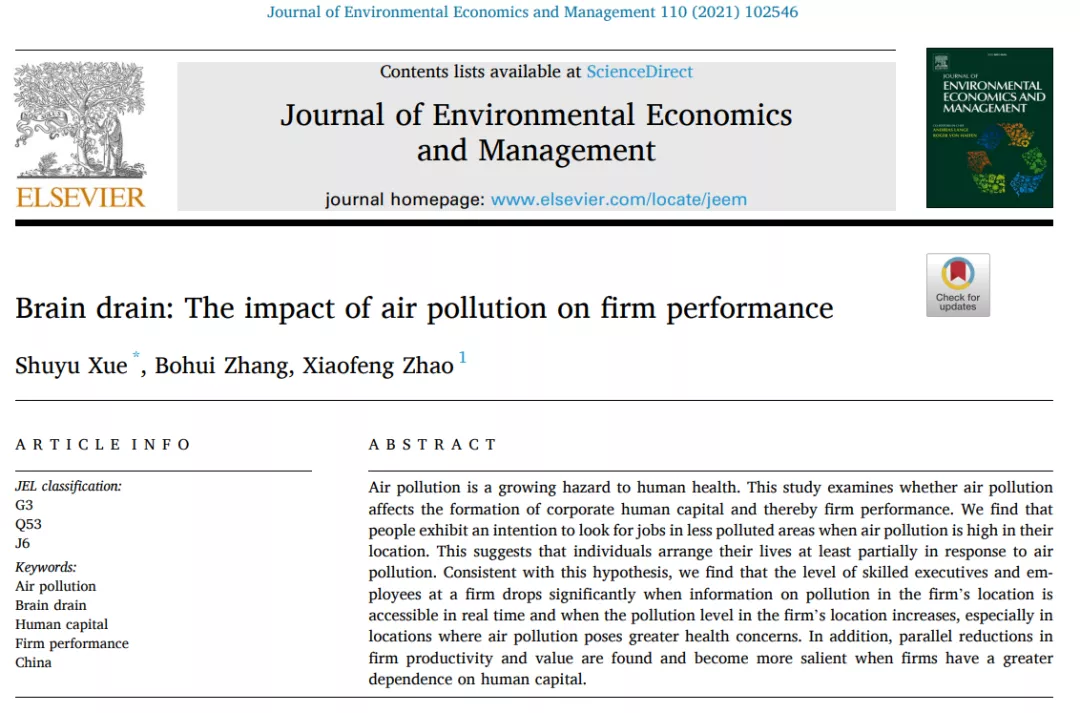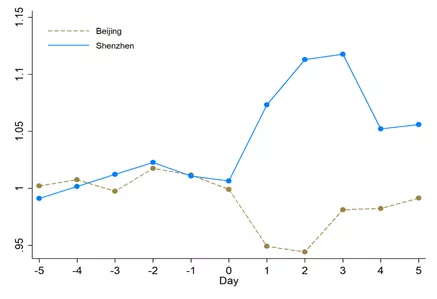Recently, the environmental finance paper Brain drain: The impact of air pollution on firm performance, co-authored by Xue Shuyu from SWUFE, Zhang Bohui from the Chinese University of Hong Kong (Shenzhen) and Zhao Xiaofeng from Lingnan University, was accepted by "Journal of Environmental Economics and Management", a first-class academic journal in the field of Environmental Economics.

Brief Introduction to the Article
Air pollution is more and more harmful to human health. This study examines whether air pollution affects the formation of corporate human capital, and hence the performance of enterprises. We found that when air pollution is high in their location, people show a higher willingness to seek work in less polluted areas. This suggests that at least some individuals plan their lives and work according to air quality. Consistent with this hypothesis, the paper finds that when the pollution information of a company's location can be accessed in real time, the higher the pollution level of the company's location, the more serious the loss of senior executives and high-level employees. This is especially true in areas with health concerns. In addition, when the enterprise human capital decreases, it also reduces the enterprise productivity and market value. This decline is even more salient if firms rely heavily on human capital.
Main contributions
It is well known that environmental air pollution can harm people's physical and mental health. Financial economists recognize that financial market participants are not immune to poor air quality. Recent research suggests that air pollution exacerbates the behavioral biases among investors and financial analysts. However, most studies so far have focused on the short-term costs of air pollution; There is little evidence of the long-term effects of air pollution on businesses. In view of the important role of enterprise human capital in enterprise value creation, this paper studies whether and how air pollution affects enterprise human capital accumulation and enterprise performance.
The article uses the Baidu search index to dynamically show the impact of air pollution on people's intention of finding a job with daily data; It provides empirical results for Tiebout's (1956) "Vote with Your Feet" model. The paper found that when air pollution occurs in an area (such as Wuhan), people living in that area show an increased willingness to work in a less polluted area (such as Shenzhen), but a decreased willingness to work in a more polluted area (such as Beijing). The trend was stronger in areas where people were more sensitive to air pollution.

This paper uses three measurement methods, including DID, 2SLS and RDD, to demonstrate that in the long run, air pollution will affect people's decision to choose a job and the enterprise's accumulation of human capital. The study found that executives, as well as highly educated or skilled workers, were more likely to work for companies in less polluted areas.
The paper found that the impact of air pollution on the loss of human resources can also lead to a reduction in companies' market value and productivity. The paper also uses DID, 2SLS and RDD to demonstrate the significant decline of enterprise productivity and enterprise value in air pollution areas. Moreover, it is found that if the enterprise is highly dependent on human resources, the effect of air pollution on productivity and enterprise value is more obvious.
